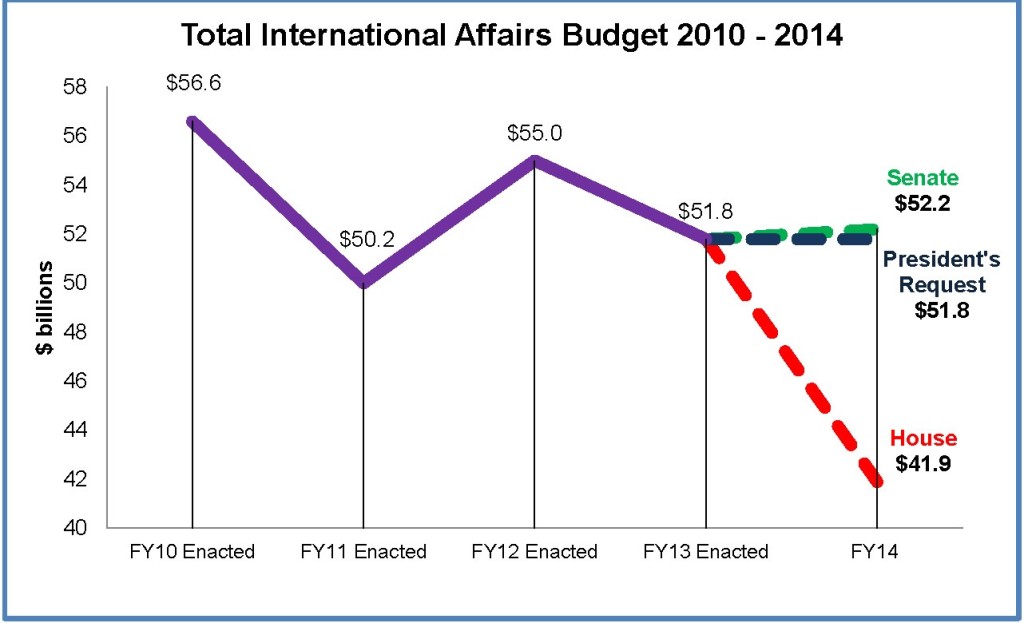
July 12, 2013
With the clock ticking to the five-week August recess and the start of FY14 on October 1, House and Senate appropriators are preparing to act on their respective State-Foreign Operations Appropriations bills, which house about 95% of the International Affairs Budget. While the House schedule remains in flux, a markup in Subcommittee later next week (Thursday, July 18) is increasingly likely and could be followed by full Committee action the week of July 22. The Senate schedule remains more firm, with Subcommittee action anticipated on July 23 and a full Committee markup on July 25.
As previously reported, there is a 29% ($10 billion) difference between the House and Senate appropriations levels for FY14 International Affairs programs. The House spending level for base (non war-related) programs is $35.4 billion – 14% below current sequestered levels and 31% less than 2010 levels. In comparison, the Senate boosts base programs to $45.7 billion – $4.4 billion (11%) above current sequestered levels. Consequently, programmatic funding levels will differ significantly between the House and Senate bills.

International Affairs Budget Snapshot
|
FY10 |
FY13 |
FY14 |
FY14 House |
FY14 Senate |
| $51.5 b Base | $41.1 b Base | $48.0 b Base | $35.4 b Base | $45.7 b Base |
| $5.1 b OCO | $10.7 b OCO | $3.8 b OCO | $6.5 b OCO | $6.5 b OCO |
| $56.6 b Total | $51.8 b Total | $51.8 b Total | $41.9 b Total | $52.2 b Total |
Next Steps
Thus far the House has approved in Committee six of the twelve appropriations bills – Agriculture; Defense; Energy-Water; Homeland Security; Military Construction/Veterans Affairs (MilCon/VA); and Transportation-HUD. Three of those measures, Energy-Water, Homeland Security, and MilCon/VA, have been approved by the House.
The Senate Appropriations Committee has also approved six bills – Agriculture; Energy & Water; Labor-HHS; Legislative Branch; MilCon/VA; and Transportation-HUD – but the full chamber has yet to take up any of the measures. Senate Republicans are objecting to the $1.058 trillion discretionary spending cap being used for the FY14 appropriations bills rather than the $967 billion sequestration level being used by House Republicans. As a result, little if any Senate action is expected on appropriations bills beyond Full Committee markups. No floor action on the State-Foreign Operations Appropriations bill is anticipated in either chamber this year, and a Continuing Resolution for FY14 will be needed again this year.
2. House and Senate Reintroduce Foreign Aid Accountability and Transparency Bill
On Wednesday bipartisan co-sponsors in the House and Senate reintroduced the Foreign Aid Transparency and Accountability Act (H.R. 2638 and S. 1271). House Foreign Affairs Committee Members Reps. Ted Poe (R-TX) and Gerry Connolly (D-VA) introduced the House measure, while Senate Foreign Relations Committee Members Senators Marco Rubio (R-FL) and Ben Cardin (D-MD) introduced the Senate companion bill. The initial legislation – introduced in the 112th Congress by Rep. Poe and former Senate Foreign Relations Ranking Member Richard Lugar (R-IN) – passed the House unanimously 390-0 last December, but was not taken up by the Senate before the end of the session.
Like last year’s version, the reintroduced bills would codify and expand the Foreign Assistance Dashboard and require the Administration to set interagency guidelines – including metrics for monitoring and evaluation – for U.S. foreign assistance programs. The House bill provides for a feedback mechanism to be added to the Dashboard, while the Senate bill includes stricter requirements on providing information on the Dashboard.
USGLC issued a press statement applauding the legislation and its co-sponsors, saying “In addition to ensuring ample funding and resources for development and diplomacy, it’s vital that we ensure the highest standards for transparency and results. This legislation does exactly that, building on the important reforms being undertaken by USAID and those modeled in the Foreign Assistance Dashboard and the Millennium Challenge Corporation.”